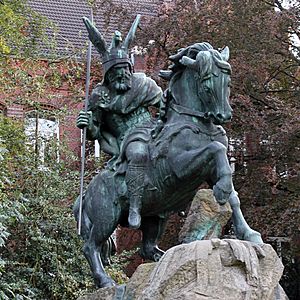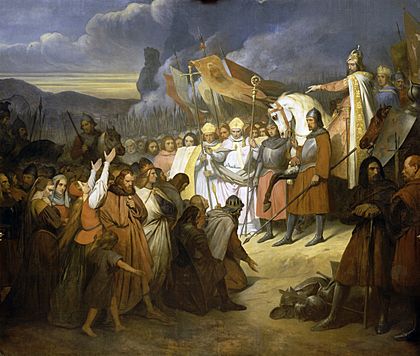Widukind facts for kids
Quick facts for kids
Widukind
|
|
|---|---|
| dux Saxonum | |

Modern statue of Widukind in Herford, North Rhine-Westphalia
|
|
| Reign | ?–785 |
| Predecessor | Theoderic |
| Successor | Egbert |
| Born | ? |
| Died | 807 or 808 possibly Enger, near Herford |
| Buried | ? Stiftskirche, Enger |
| Noble family | House of Odon, possibly progenitor of Immedingians |
Widukind, also known as Wittekind, was a brave leader of the Saxons. He was the main opponent of the Frankish king Charlemagne during the Saxon Wars. These wars happened from 777 to 785. Charlemagne eventually won, making Saxony a part of his Frankish kingdom. He also ordered many Saxons to become Christian instead of following their old pagan beliefs. Over time, Widukind became a symbol of Saxon freedom and a legendary figure.
Contents
Widukind's Life Story
Not much is known about Widukind's early life. His name means "child of the forest." Old writings from his enemies, the Franks, describe him. They called him an "insurgent" or "traitor." These writings show him as the leader of the Saxon resistance. However, his exact role in the battles is not fully clear.
The Saxon Wars Begin
In 772, the Franks, led by Charlemagne, started fighting in Saxony. Charlemagne ordered the destruction of a holy Saxon place called the Irminsul. The Saxons fought back. Tribes from Westphalia attacked a church, and others surrounded a Frankish court. Charlemagne responded by trying to make Saxony a part of his kingdom.
Widukind's First Appearance
Widukind is first mentioned in 777. He was the only Saxon noble who did not show up at Charlemagne's meeting. Instead, he stayed with the Danish king Sigfred. The next year, the Westphalians invaded the Frankish Rhineland. They fought against Charlemagne's forces while the king was busy in Spain.
Rebellion and Conversion
By 782, Widukind had returned from Denmark. He encouraged the Saxon nobles to rebel against Charlemagne. From 782 to 784, there were many battles. Charlemagne had 4,500 Saxons executed in a place called Verden. Widukind teamed up with the Frisians. But Charlemagne's winter attacks in 784 and 785 were successful. Widukind and his allies were pushed back.
In 785, Widukind agreed to surrender. He was promised that he would not be harmed. He and his allies were then baptized, becoming Christian. This likely happened in Attigny. Charlemagne himself was Widukind's godfather. This agreement brought peace and recognized the Saxon nobles' status.
After His Baptism
There are no clear records about Widukind's life or death after he became Christian. Some historians think he might have been sent to a monastery. This happened to other leaders defeated by Charlemagne. Others believe he might have worked in the administration of occupied Saxony. One old story says he went with Charlemagne on a military campaign. Another story from the 12th century says he was killed by Charlemagne's brother-in-law.
Widukind's Legend

Many stories and legends grew around Widukind. He was sometimes seen as a saintly figure. People even called him "Blessed Widukind." He was also said to have built many churches. It is believed he died in 807 or 808. His special day is celebrated on January 6.
The Vision of Widukind
One famous legend tells of Widukind's conversion. He was spying on Charlemagne's camp during Easter, dressed as a beggar. He saw a priest performing a special Christian ceremony. During this ceremony, the priest held a beautiful child. Widukind was amazed to see the priest give the same child to everyone receiving communion.
After the ceremony, Widukind went to beg outside. One of Charlemagne's servants recognized him by a unique finger. Widukind was captured. He admitted he was spying to learn more about the Christian faith. He then shared the amazing vision he had seen. Charlemagne believed that God had shown Widukind the divine child, Jesus, in the holy bread of the Mass. After this, Widukind stopped worshipping his old pagan gods.
How People Saw Widukind Later
In the Middle Ages
From the 9th century onwards, Widukind was seen as a mythical hero. Around 1100, a tomb was made for him in Enger. Recent discoveries show that the tomb's contents are from that time. However, they are the remains of a young woman. In 1971, archaeologists found three graves near the altar. The remains of three men from the early 9th century were found. DNA tests in 2002 showed they were related. One of the men buried there is thought to be Widukind.
When Saxon kings took over from Frankish kings in the 10th century, they proudly claimed to be Widukind's descendants. For example, Matilda, the wife of King Henry I, was supposedly a great-great-great-granddaughter of Widukind. Other noble families also claimed to be related to him.
In German Nationalism
In the early 20th century, Widukind became a hero for German nationalists. Some saw him as a brave defender of Germany's old beliefs and gods. They believed he resisted the Christian religion. Christian nationalists also praised him. They linked Charlemagne to French control after World War I. They saw Charlemagne as a "French" invader.
After the Nazi Party came to power in 1933, many plays and works were written about Widukind. Alfred Rosenberg praised him as a hero of German freedom. Two important plays about him were made in 1934. One celebrated his conversion. The other, however, was controversial. It had strong anti-Christian messages. In this play, Saxon leaders say, "That is what the Christians have done; they pretend love, but bring murder!" This line caused protests. The play showed Catholic leaders trying to destroy German freedom. They wanted to force different races to mix. Widukind only converted to save his people from this. He gave a speech saying that the survival of the German race was his main concern. He believed future generations would praise him for this.
Today
Many buildings in the area of Enger are named after Widukind. This includes the Widukind-Gymnasium Enger, a school.
See also
 In Spanish: Viduquindo para niños
In Spanish: Viduquindo para niños
 | John T. Biggers |
 | Thomas Blackshear |
 | Mark Bradford |
 | Beverly Buchanan |

